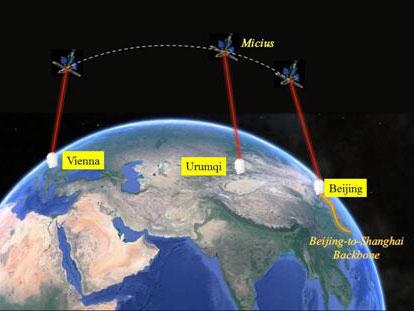Scientists hold world's first intercontinental video conference using quantum encryption
'Private and secure communications are fundamental human needs,' says Chinese Academy of Sciences

Your support helps us to tell the story
From reproductive rights to climate change to Big Tech, The Independent is on the ground when the story is developing. Whether it's investigating the financials of Elon Musk's pro-Trump PAC or producing our latest documentary, 'The A Word', which shines a light on the American women fighting for reproductive rights, we know how important it is to parse out the facts from the messaging.
At such a critical moment in US history, we need reporters on the ground. Your donation allows us to keep sending journalists to speak to both sides of the story.
The Independent is trusted by Americans across the entire political spectrum. And unlike many other quality news outlets, we choose not to lock Americans out of our reporting and analysis with paywalls. We believe quality journalism should be available to everyone, paid for by those who can afford it.
Your support makes all the difference.Two scientists in Austria and China have held the first intercontinental video conference to have been encrypted using quantum technology.
In the Alice in Wonderland world of the incredibly small, things can be in two places at once, merely looking at a particle can alter its twin on the other side of the universe at the same time, and theoretical cats can be both alive and dead.
This sounds almost unbelievably odd but the physics that explains it has some important real-world implications.
And one of those is encrypting communication so there is no chance of anyone – be they hackers, spies or the security services – eavesdropping on private conversations.
A statement issued by the Chinese Academy of Sciences reported that its president, Chunli Bai, had held a video conversation with his counterpart at the Austria Academy of Sciences in Vienna, Anton Zeilinger, in the “first real-world demonstration of intercontinental quantum communication”.
“Private and secure communications are fundamental human needs,” the statement said.
“In particular, with the exponential growth of Internet use and e-commerce, it is of paramount importance to establish a secure network with global protection of data.
“Traditional public key cryptography usually relies on the perceived computational intractability of certain mathematical functions.
“In contrast, quantum key distribution (QKD) uses individual light quanta (single photon) in quantum superposition states to guarantee unconditional security between distant parties.”
Technical reasons had previously limited such conversations to distances of a few hundred kilometres, the academy said, but they had found a “promising solution to this problem” involving a “sophisticated satellite, named Micius”.
It is equipped with “a decoy-state QKD transmitter, an entangled-photon source, and a quantum teleportation receiver and analyser”. Five ground stations have also been built in China and Tibet.
The Chinese science academy said the encrypted communication system was being trialled for potential “real-world applications by government, banks, securities and insurance companies”.
There are plans to carry out similar test conversations between someone in China and four other places, Singapore, Italy, Germany and Russia.
Join our commenting forum
Join thought-provoking conversations, follow other Independent readers and see their replies
Comments